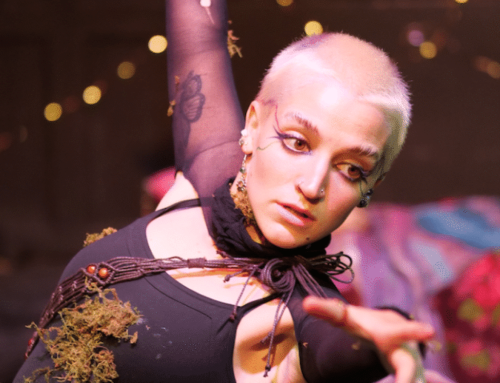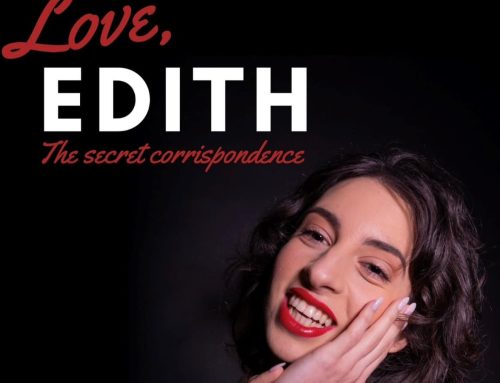The Sea Horse, Edward J Moore’s grim slice of mid-century realism, debuted to solid reviews off-Broadway in 1974. Since then, the two-hander has mostly disappeared from the repertory, and the piece seems never to have had a professional UK production until now. Hats off then to producers Mark Cheng and Vicky MacRae, and director Mandi Riggi for excavating the work and taking a chance. Riggi’s production is solid, and the performances are likeable, if flawed. But the play’s gender politics jar awfully, and the mannered mid-century milieu—small spaces, large emotional stakes—feels claustrophobic and dated.
Tough, non-nonsense, emotionally unavailable Gertude (Rachael Bellis) runs a seedy waterside bar somewhere on the American coast (there is a hint it is Northern California). The roof leaks, rain has seeped into every corner, and poor Gertie is reduced to sleeping on the back patio — a metaphor perhaps for the character’s wounded psychological condition.
Gertie, whose bitter cynicism and self-loathing are almost palpable, has been having an on-off, friends-with-benefits, skeleton of a relationship with hard-drinking merchant seaman Harry (Jay Rincon) for what may be years. Both are trapped in their environments. His is the sea, whose tempestuous storms set the tone of the piece. Hers is an emotional prison patrolled by the ghosts of body dysmorphia, a dead father, and an abusive ex-husband.
But now Harry is back from a two-month trip on a tramp steamer. On the journey, he has had an epiphany (it is never quite clear why). He wants to start fresh, by which he means settling down, buying a small boat, getting married and having a son. He has even purchased a wedding dress as a coming-home gift for the bar owner, which suggests a level of cocksure arrogance that really ought to put the woman off for life. Can he persuade Gertie to leave the past behind and learn to trust him? “I love you, Gertie,” he tells her. “It’s me you’re talking to, Harry,” she replies, suggesting the man has his work cut out. Moore dials up the intensity to deliver an evening, and the following morning, suffused with sexual tension, violent desire, and long-suppressed guilt.
Putting two damaged blue-collar characters in a cramped room promises fireworks, and the play ought to work better than it does. It is not that The Sea Horse lacks emotional truth — the problem is its architecture assumes a world where dogged male persistence equals romance and dogged female resistance somehow equals fear of love. Navigating the stormy waters of their past to find a safe harbour together means, in effect, Harry treating Gertude’s trauma and resistance to intimacy as something to be overcome. This is coercion, not love. It all feels a bit off. Riggi has not found a modern take on the piece here, and perhaps there isn’t one.
Bellis and Rincorn are likeable, charismatic performers, but neither really convinces. Bellis is not dissolute and decayed enough to be the gin-sipping, battered bar broad she is supposed to be. Her regulars sing songs about “the old dirty Gertie” who, if she likes you, will “give you a ride”, but what Bellis delivers is a bit of a frump: less Blanche DuBois and more Julie Andrews with a hangover. Rincorn’s performance is big, perhaps too big. He taps his fingers, beats his chest, wrings his hands, and slaps the floor like a dog demanding to be taken for a walk. It is tremendous to watch, but Harry’s vulnerability is missing. This is a character who talks eruditely to his ship, communes with the sea, and dreams of freedom, escape and a better future. This softer side to the man does not really emerge.
Shahaf Beer’s set suggests a suitably shabby dive bar, and Riggi uses it effectively. But the details are not correct. Surely Cointreau and Gordon’s Gin are not the tipples of choice for the type of hard-working, hard-drinking, Californian seamen who frequent the place (“pouring them out and kicking them out” is how Gertie describes her job). And what on earth is a MacEwen’s Lager ashtray doing there? This could be the Rovers Return or an officers’ mess in Cheltenham.
Riggi and her team deserve a pat on the back for taking a chance with this piece, and her craftwork is strong. But ultimately, if The Sea Horse does not get another airing for forty more years, it may be nobody’s loss.
Writer: Edward J Moore
Director: Mandi Riggi
New – Online Shop!
My collected theatre reviews now available in paperback format for the years 2022 and 2023.
Just £10 per copy.
Over 100 reviews in each book.
- John Cutler’s Collected Theatre Reviews – Volume One. 2022. Paperback. 296 pages. ISBN 9781805179757. £10
-
John Cutler’s Collected Theatre Reviews – Volume Two. 2023. Paperback. 284 pages. ISBN 9781836884170. £10
Visit my Online Shop or click on Buy Now to order your copies.
More Recent Reviews
The Sea Horse. Golden Goose Theatre.
The Sea Horse, Edward J Moore’s grim slice of mid-century realism, debuted to solid reviews off-Broadway in 1974. Since [...]
Garry Starr: Classic Penguins. Arts Theatre.
Emperor penguins’ shortish treks between sea and nesting sites are about as peripatetic as your average Thameslink commuter. Garry [...]
When the Clarion Came to Call. Cockpit Theatre.
When, upon entering an auditorium, you are told, ‘Take as many pictures as you like, but mind the ceramics,’ [...]







